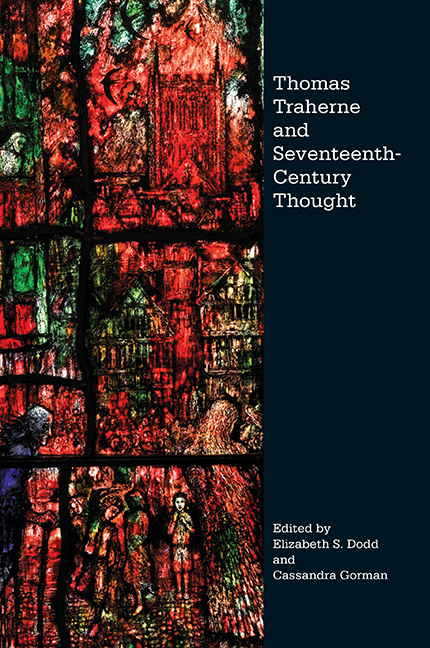Book contents
- Frontmatter
- Contents
- Contributors
- Acknowledgements
- Conventions and Abbreviations
- Foreword
- Introduction: ‘A lover of all Things … An Active ey’ (Select Meditations I.82): Traherne in Context
- PART I PHILOSOPHIES OF MATTER AND SPIRIT
- PART II PRACTICAL AND PUBLIC DEVOTION
- 5 Crossing the Red Sea: The Ceremonial Law, Typology and the Imagination
- 6 Sectarianism in The Ceremonial Law
- 7 Thomas Traherne and the Study of Happiness
- 8 ‘Innocency of Life’: The Innocence of Thomas Traherne in the Context of Seventeenth-Century Devotion
- Afterword by Jacob Blevins
- Chronology of Traherne's Life and Contemporary Intellectual Developments
- Bibliography
- Index
- Index of Biblical References
- Studies in Renaissance Literature
7 - Thomas Traherne and the Study of Happiness
from PART II - PRACTICAL AND PUBLIC DEVOTION
Published online by Cambridge University Press: 05 July 2016
- Frontmatter
- Contents
- Contributors
- Acknowledgements
- Conventions and Abbreviations
- Foreword
- Introduction: ‘A lover of all Things … An Active ey’ (Select Meditations I.82): Traherne in Context
- PART I PHILOSOPHIES OF MATTER AND SPIRIT
- PART II PRACTICAL AND PUBLIC DEVOTION
- 5 Crossing the Red Sea: The Ceremonial Law, Typology and the Imagination
- 6 Sectarianism in The Ceremonial Law
- 7 Thomas Traherne and the Study of Happiness
- 8 ‘Innocency of Life’: The Innocence of Thomas Traherne in the Context of Seventeenth-Century Devotion
- Afterword by Jacob Blevins
- Chronology of Traherne's Life and Contemporary Intellectual Developments
- Bibliography
- Index
- Index of Biblical References
- Studies in Renaissance Literature
Summary
If any man Should ask me what God was doing before the world began? I would not Answer with Saint Austin: that He was makeing Hell For such Busy enquirers. But studying from Eternity to do all in the most Perfect manner. For all things are so perfect that they [are] worthy to be Seen For ever, and are in very Deed, the Product of Eternal Study.
(Select Meditations, Ross, V, III.89)Felicity is a central theme in both the poetic and prose works of Thomas Traherne. The most evident example is the collection entitled Poems of Felicity: Divine Reflections on the Native Objects of an Infant-Ey. This opens with an address to the reader announcing that the poems were written ‘to th'end thy Soul might see/ With open Eys thy Great Felicity’ (‘The Author to the Critical Peruser’, Poems of Felicity, Ross, VI, p. 84, 7–8) All of the Poems of Felicity, as well as the collection known as the Dobell poems, deal one way or another with the question of how felicity is attained, experienced, and enjoyed. The same is true of the volume commonly known as the Thanksgivings, in which the condition of felicity is expressed in terms of gratitude. On the title page of Commentaries of Heaven, Traherne announces that ‘The Mysteries of Felicitie are opened and ALL THINGS Discovered to be Objects of Happiness’ (Commentaries, Ross, II, p. 3). On several occasions within this manuscript, he speaks of a ‘schole of happiness’, or sometimes a university, as in the following lines:
My Soul, a Graduate in Excellence Life vertu Wisdom Sence Felicitie In this Transcendent Universitie Heres Schole and Book and Doctor all in one And the Professors Chair's an Heavenly Throne.4 (‘Act II’, Commentaries, II, p. 186)
In the most autobiographical section of the Centuries of Meditations, probably Traherne's best-known work, he tells the story of how the study of happiness became the sole purpose of his life, and how he attained it:
When I came into the Country, and being Seated among silent Trees, had all my Time in mine own Hands, I resolved to Spend it all, whatever it cost me, in the Search of Happiness, and to Satiat that burning Thirst which Nature had Enkindled, in me from my Youth.
- Type
- Chapter
- Information
- Thomas Traherne and Seventeenth-Century Thought , pp. 154 - 171Publisher: Boydell & BrewerPrint publication year: 2016

